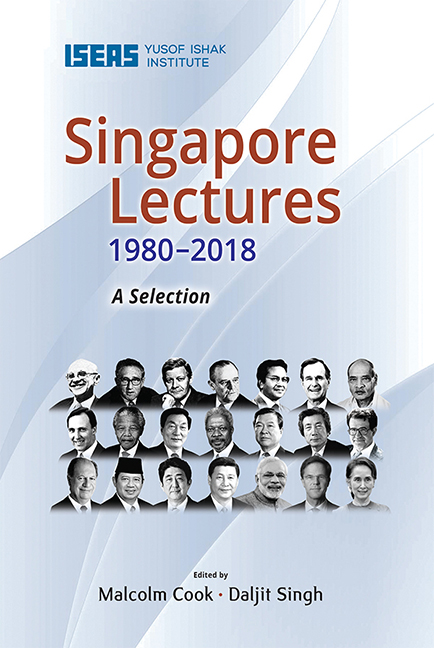Book contents
- Frontmatter
- Contents
- Introduction
- 1 The Invisible Hand in Economics and Politics
- 2 American Foreign Policy: A Global View
- 3 The Soviet Union: Challenges and Responses as Seen from the European Point of View
- 4 Trends in the International Financial System
- 5 Regionalism, Globalism and Spheres of Influence: ASEAN and the Challenge of Change into the 21st Century
- 6 US Policy in the Asia-Pacific Region: Meeting the Challenges of the Post-Cold War Era
- 7 India and the Asia-Pacific: Forging a New Relationship
- 8 Australia, Asia and the New Regionalism
- 9 South and Southern Africa into the Next Century
- 10 China and Asia in the New Century
- 11 Global Values: The United Nations and the Rule of Law in the 21st Century
- 12 Peace on the Korean Peninsula and East Asia
- 13 Japan and ASEAN in East Asia: A Sincere and Open Partnership
- 14 EU and Asia: Sharing Diversity in an Inter-regional Partnership
- 15 Global Challenges in the 21st Century: A View from Chile
- 16 Indonesia: The Challenge of Change
- 17 Japan and ASEAN, Always in Tandem: Towards a More Advantageous Win-Win Relationship through My “Three Arrows”
- 18 Forging a Strong Partnership to Enhance Prosperity of Asia
- 19 India’s Singapore Story
- 20 The Netherlands, Singapore, Our Regions, Our World: Connecting Our Common Future
- 21 Democratic Transition in Myanmar: Challenges and the Way Forward
- The Singapore Lecture Series
- The Editors
10 - China and Asia in the New Century
Published online by Cambridge University Press: 09 October 2021
- Frontmatter
- Contents
- Introduction
- 1 The Invisible Hand in Economics and Politics
- 2 American Foreign Policy: A Global View
- 3 The Soviet Union: Challenges and Responses as Seen from the European Point of View
- 4 Trends in the International Financial System
- 5 Regionalism, Globalism and Spheres of Influence: ASEAN and the Challenge of Change into the 21st Century
- 6 US Policy in the Asia-Pacific Region: Meeting the Challenges of the Post-Cold War Era
- 7 India and the Asia-Pacific: Forging a New Relationship
- 8 Australia, Asia and the New Regionalism
- 9 South and Southern Africa into the Next Century
- 10 China and Asia in the New Century
- 11 Global Values: The United Nations and the Rule of Law in the 21st Century
- 12 Peace on the Korean Peninsula and East Asia
- 13 Japan and ASEAN in East Asia: A Sincere and Open Partnership
- 14 EU and Asia: Sharing Diversity in an Inter-regional Partnership
- 15 Global Challenges in the 21st Century: A View from Chile
- 16 Indonesia: The Challenge of Change
- 17 Japan and ASEAN, Always in Tandem: Towards a More Advantageous Win-Win Relationship through My “Three Arrows”
- 18 Forging a Strong Partnership to Enhance Prosperity of Asia
- 19 India’s Singapore Story
- 20 The Netherlands, Singapore, Our Regions, Our World: Connecting Our Common Future
- 21 Democratic Transition in Myanmar: Challenges and the Way Forward
- The Singapore Lecture Series
- The Editors
Summary
On 30 November 1999, Premier of the State Council of the People's Republic of China Zhu Rongji gave the 17th Singapore Lecture after being welcomed by Deputy Prime Minister Lee Hsien Loong. Premier Zhu was the first Chinese political leader and second leader from Northeast Asia to give a Singapore Lecture. Befitting China's size and Premier Zhu's responsibilities, his speech focuses on changes to the Chinese economy and the benefits for Asia and the world of Chinese economic development and growth. The lecture serves as an early statement on China's emerging central economic role in Asia and globally.
Your Excellency Prime Minister Goh Chok Tong, Ladies and Gentlemen, Friends,
Thank you, Your Excellency Deputy Prime Minister Lee Hsien Loong.
The Singapore Lecture is a highly acclaimed international forum. State leaders, eminent politicians, specialists and scholars from many countries have made weighty and inspiring remarks on regional and international issues at this forum. Today, I feel greatly honoured and delighted to have the opportunity of meeting you, people from different circles in Singapore, briefing you on developments in China and discussing with you the development prospects for China and Asia. Many of you here are old friends and long-term partners of the Chinese people. I would like to take this opportunity to express my sincere thanks to you and all other Singapore friends who have contributed to enhanced friendship between our two peoples.
Mankind is at the threshold of the 21st century. In the evolution of world civilization, the 20th century is one of hardships and sufferings as well as one of unprecedented material and spiritual wealth. The rise of Asia and the enormous changes in China represent one of the greatest miracles of this century.
From the mid-19th century to the mid-20th century, the Chinese people fought courageously and finally won national independence and liberation and founded New China. Not long ago, the Chinese people held a grand celebration of the 50th anniversary of the People's Republic of China. Over the past fifty years, China has witnessed earth-shaking changes. For the past twenty years in particular since China started its reform and opened up to the outside world, it has scored even more remarkable achievements in its socialist modernization drive.
- Type
- Chapter
- Information
- Singapore Lectures 1980-2018 , pp. 159 - 185Publisher: ISEAS–Yusof Ishak InstitutePrint publication year: 2020

